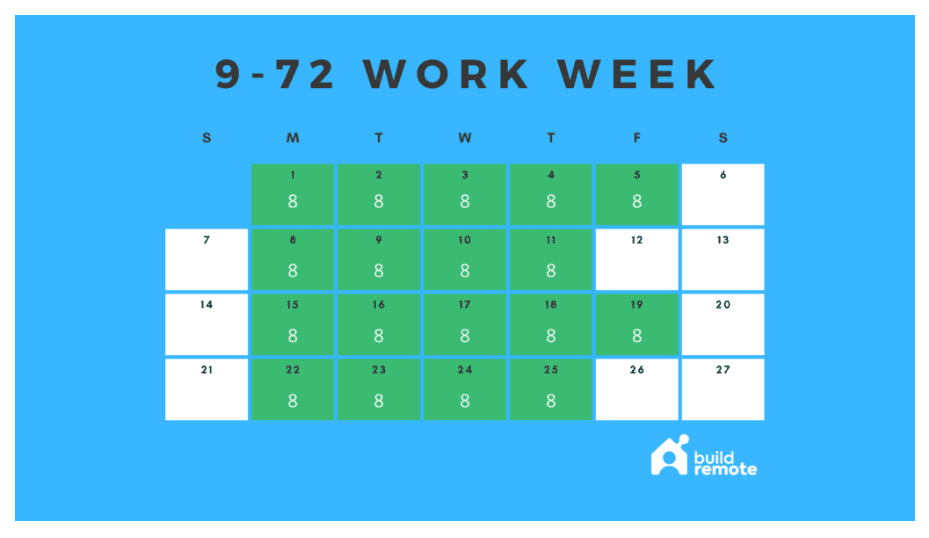The Ultimate Guide to the 4 Day Work Week
We discuss what a 4 day work week is, it's history, the different types of implementations, which countries and companies have tried a 4 day work week, the research undertaken, as well as it's future.

What is a 4 day work week?
A 4 day work week is an arrangement where individuals work for four days a week while still earning the same salary. A four-day work week is a schedule that typically has its employees working from Monday to Thursday with Fridays off.
There are three main types of 4 day work week:
- Employees work 4 “normal” days e.g. 4 × 8 hour days = 32 hours
- Employees work 5 “shorter” days e.g. 5 × 6 hour days = 30 hours
- Employees work 4 “longer” days e.g. 4 × 10 hour days = 40 hours. This is sometimes called a compressed workweek or a “short-hours workweek”.
Mostly commonly, however, a “4 day work week” refers to an employee who works 4 days instead of 5, with no drop in salary.
Source: Build Remote
Are 4 day work week jobs paid at a reduced salary?
There are 2 types of 4 day work week:
- One where the salary is the same as a full time position
- One where the salary is 80% of a full time position
The 4DWW movement, however, is campaigning for no reduction in salary. Therefore, if you work at a company which truly embraces the 4 day work week, you should expect to get paid at normal market rates.
One company which fully embraces the 4DWW is Buffer. Buffer also has a transparent salary policy, so you can decide if you think salaries are reduced.
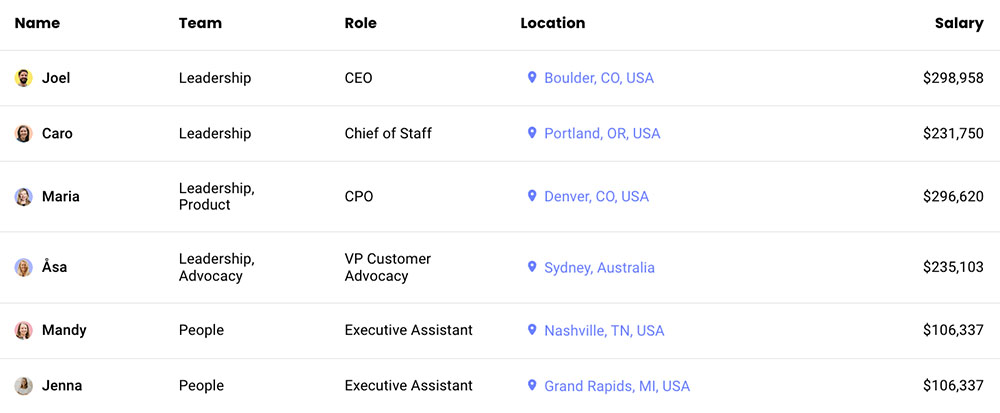
Pretty crazy / awesome, right?
And here's is a list to 300+ companies with a 4 day work week.
Definitions
What does 4DWW stand for?
4DWW is an abbreviation for “4 day work week”.
What is a 6 hour work day?
Instead of working 4×8hr days, some companies instead prefer to work 5 shorter days (i.e. 5×6hrs). This is a specific implementation of a “4 day work week”. Really, the goal of the "4 day work week" movement is a reduction in working hours, whilst maintaining 100% output and receiving 100% salary.
What is a 4/10 work week?
A 4/10 work week is a schedule where employees work 4 days per week, 10 hours per day. This is known as a “compressed work schedule”.

What is a 9/80 work week?
A 9/80 work week is a schedule where employees work 80 hours over 9 days.
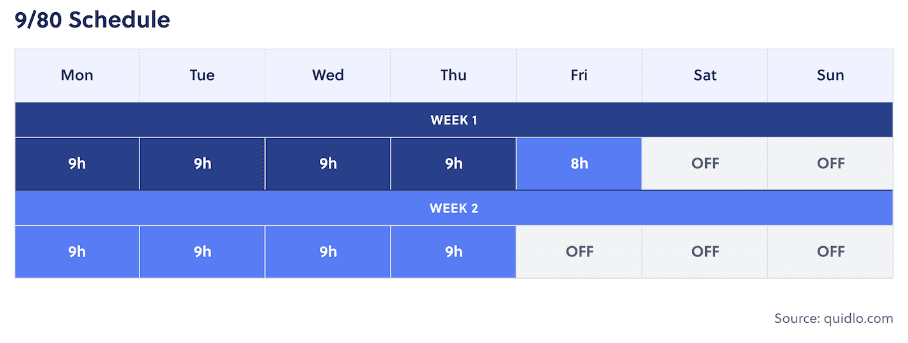
Often this is implemented as 5×9 hours days, with a normal 2 day weekend, followed by 3 more 9 hours days, finishing with 1 more 8 hour day. In other words, it allows for employees to have every 2nd Friday off.
What is a 7/72 work schedule?
The 9-72 work week is similar to the 9-80 work schedule. However, it involves only 8-hour work days. This means that there are 72 working hours over two weeks, and you'll benefit from having every other Friday off.
Source: Build Remote
Would you like a 4 day work week?
Background, History and Future
Where does the 4 day work week originate from?
Firstly, let’s consider how we ended up with the current standard of working 5 days per week. The 5 day work week was popularised by Henry Ford in 1926, where employees switched from a 6 day work week to working 40 hours over 5 days in his automobile factories. The USA then officially adopted the 5 day work week after years later (1932), partly in an attempt to reduce unemployment after the Great Depression.
A four day work week is also an idea which has been around for some time and is now resurfacing in the 21st century. The original movement for a 4 day work week began in the 1970, but it lost momentum unfortunately. When the COVID pandemic began, a new movement began which questioned the nature of work in general. A huge number of staff switched to working at home, with flexible working arrangements commonplace. Ultimately, the pandemic has created a new wave of optimism around the 4 day work week, with many countries and companies piloting different schemes in 2020 and 2021.
What day off do 4 day week companies take off?
This varies from company to company but more companies take Fridays off - with Mondays off as the 2nd most popular choice.
But really it's more complicated than that - here's a breakdown of what day each 4 day week company took off in a recent UK pilot:
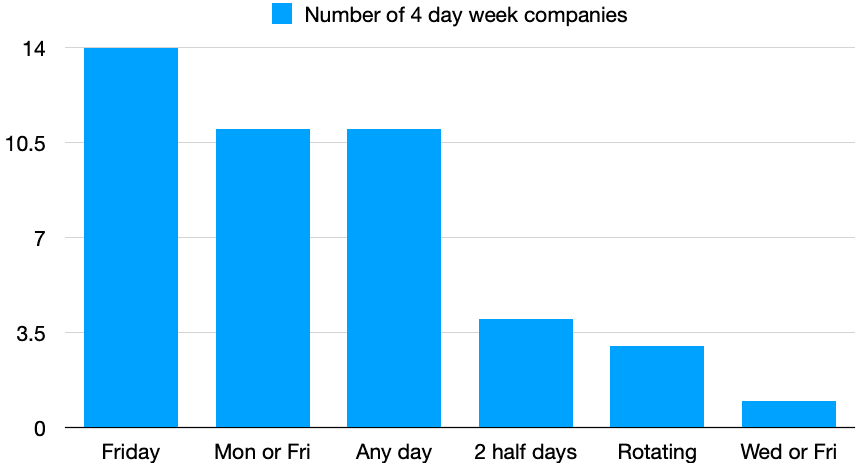
Is the Four Day Work Week coming?
Based on Google Trends data, public interest in a 4 day work week has been rising for the last 10 years:

Analysis of Ahrefs data also shows a similar trend where that has been a steady increase in the number of news articles mentioning a 4 day work week:
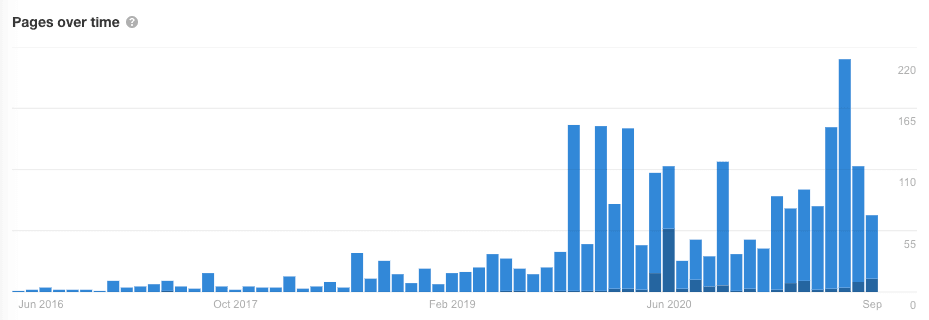
According to ZipRecruiter, the number of job listings which are a 4 day work week has also been rising:
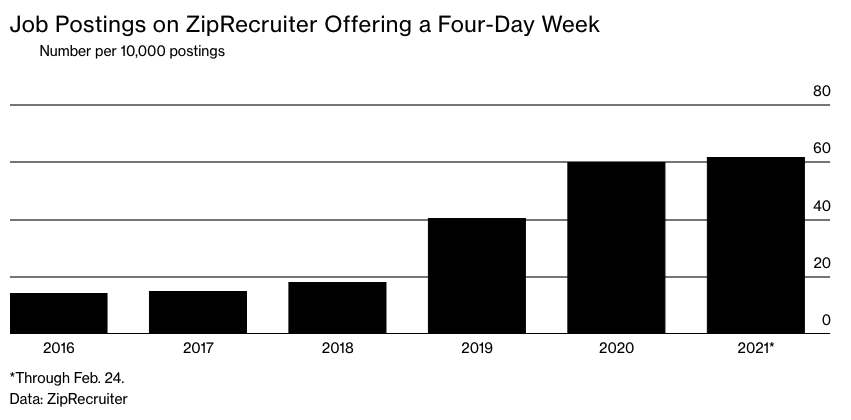
Covid, and it’s impact on the nature of work, has only accelerated this trend. If we consider that many countries have now piloted a 4 day work week (e.g. Spain, Japan, Scotland, Iceland & Ireland), as well as the rise in number of companies offering a 4DWW - it is safe to say that (in all likelihood) the mainstream adoption of a 4 day work week is just around the corner.
Research and Studies
Which countries have tried a 4 day work week?
There are now many countries which have trialed a 4 day work week pilot. For example:
- Spain: The government has accepted it’s proposal to pilot a voluntary 4 day work week (32hrs) across the country
- Iceland: The Reykjavík City Council and Nation Government piloted a study (2,500 employees) which paid the same amount for shorter hours.
- Japan: the Japanese government says it encourages employers to implement a 4 day work week, in an attempt to improve work-balance of its residents.
- Ireland: the Irish government is funding research to investigate the potential benefits of a 4 day work week.
- Scotland: The Scottish government has invested £10 million into a pivot study which will help companies explore the potential pros and cons of a 4 day work week.
In many other countries, unions, local authorities and charities are actively campaigning for a 4 day work week:
- Germany: Germany’s largest trade union, IG Metall, has agreed wage increase which can either be paid, or used as part of a switch to a four-day week.
- Australia: The ACT Government is investigating the feasibility of a 4 day work week.
- Canada: A 4DWW is being trialled in various Towns across Canada.
- Denmark: A small Danish county recently introduced a 4 day work week (35hrs) for it’s 300 staff.
- India The Labour Ministry is considering whether to offer flexibility to companies to have a 4DWW
- Finland: The newly elected prime minister, Sanna Marin, has proposed that the country adopts a 4 day work week, at a recent panel discussion
- Gambia: Gambia’s President, Yahya Jammeh, has said it plans making Friday a day of rest to allow people to have more time for prayer and agriculture.
What 4 day work week research has been conducted?
The idea of a shorter work week has been around for decades with a number of studies researching the advantages and disadvantages a 4 day week creates.
Most of the recent large pilots have been run by 4 Day Week Global. 4DW Global have ran various large scale pilots across 100's of private companies in various countries such as:
The effects of having a shorter workweek has also been studied in academic research:
- Lepinteur (2016) studied European Community Household Panel data from Portugal and France, suggesting “reduced working hours generated significant increases in job & leisure satisfaction of the workers affected in both countries, with the rise in Portugal mainly being explained by greater satisfaction with working hours and working conditions”.
- Haar et al (2018) studied the 4 day work week of Perceptual Guardian which found that there was no change in job performance. They also studied other factors such as employee stress, work-life balance and employee retention, showing a positive impact across the board.
- Bird et al (2010) describe the implementation of a 4 day work week as “inevitable”
- Aagaard et al (1975) surveyed 474 employees in a large company who were working a 38 hour work week. They found that productivity remained constantly, although numbers varied for different demographic groups (e.g. by age and gender)
- Baltes (1999) studied flexible and compressed work week schedule, where the effects of both were described as “positive” overall
Are 4 day work weeks more productive?
Four day work weeks have been show in many studies to increase productivity. For example:
- Researchers in Iceland found that output remained the same, despite working shorter hours.,
- Perpetual Guardian, a finance advising company from New Zealand, report that reducing employees’ work schedules to a 4 day work week doesn’t harm their productivity or company output
- In a recent study, Microsoft found that productivity increased 40% when they transitioned from a five-day workweek to a four-day workweek. Employees reported that they felt less stressed, more refreshed and generally happier
- Other studies have also shown that absenteeism drops significantly.
Pros and cons of a 4 day work week
The 4 day work week is becoming more popular in developed countries due to the benefits it offers. For example:
Pros:
- It’s easier to recruit as 4DWW job listings get more applications
- Employees will be more productive and less stressed because they have a better work-life balance
- Employees will be happier
- Employees are less likely to leave the company
- It’s better for the environment
- Reduced employee absenteeism
- A 4 day week can reduce costs (e.g. less office space, potentially lower salaries to attract the same talent)
- If more companies adopted a 4 day week, there would be less vehicles on the road (i.e. faster commute time)
There are some things to consider, however when switching to a 4 day work week however.
Cons:
- It’s more difficult to implement in some industries (e.g. healthcare)
- Productivity must increase by 25% to be able to maintain 100% output. The good news is that this has happened in almost every 4 day week pilot so far.
- There are operational challenges in switching to a 4 day work week (e.g. changing employment contracts, calculating holiday entitlement etc)
Getting a 4 day work week job
Which companies have a 4 day work week?
Many companies now offer a 4 day work week including:
How can I help progress the 4 day work week movement?
There are now many different action groups setup in countries across the world. The aim of these organisations is to conduct new research and put pressure on politicians to trial a 4 day work week, for example:
If you support the movement you could volunteer at one of these non-profits or sign the petition on 4 Day Week Global.
How to find a 4 day work week job?
You can find software jobs with a 4 day work week on our job board.

